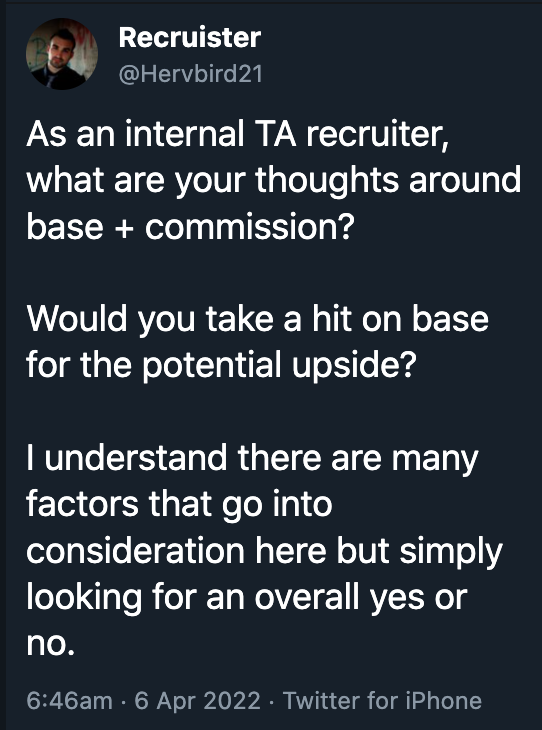First, shoutout to @Hervbird21 (Recruister) on Twitter for starting this conversation (Editor’s Note: Hervbird21 I don’t know who you are but send me a note and I’ll share your LinkedIn if you’d like) Also, take a look at the Twitter thread as there are some exceptional recruiting thought leaders who had thoughts on this subject.

I’ve written about this a number of times over the years, but with the recruiting market being so hot right now, I’ve actually had a number of Recruiter compensation calls with corporate TA leaders trying to figure out three main things: 1. How do we retain our recruiters; 2. How do I attract more recruiters; 3. How do we reward great recruiting performance?
First, I’m all in on the fact that recruiters should be paid in a pay-for-performance model. That doesn’t mean that corporate recruiters, agency recruiters, and RPO should all be paid the same way. All three of those roles are different and should be compensated based on what the organization needs from each recruiter.
Let’s take a look at the Pros and Cons of Performance Pay for Corporate Recruiters
Pros:
- You get more of what you measure and more of what you reward.
- Your best recruiters will be compensated more, and higher compensation is tied to longer tenure.
- Low performers and internal recruiters who actually hate recruiting will hate it and self-select out.
- It will most likely raise individual recruiting team member performance in the aggregate.
Cons:
- You will most likely have turnover with this type of change
- Potentially, you could get behaviors that aren’t team-oriented. (IE., senior recruiters not helping junior recruiters)
- Potentially, you could lower your quality of candidates as recruiters move quickly to gain performance comp. (the quantity over quality argument)
- It actually might increase your compensation budget, initially, until you can find the model that is most effective.
Okay, wait, why did I say “potentially” on the Cons? Primarily, because it truly depends on the model design. Just making a decision to pay more for hires is ridiculous and leads to bad outcomes. But, developing a model that rewards individual performance that is based on recruiting behaviors that lead to better hires, quickly, and in a team setting, well, now you diminish the negative outcomes of pay for performance.
How could we make pay for performance work for corporate recruiters?
I’m not trying to dump on all the folks who commented on “Quarterly Bonuses” but stop that! “Quarterly Bonus” really means, “I don’t want to be individually measured and held accountable, but I also want more money on top of my great base salary”. Quarterly bonuses in most corp TA shops are a joke. They are usually based on Hiring Manager satisfaction and days to fill, two of the most subject measures that have zero correlation to better recruiting.
Also, internal recruiting pay for performance is not just a modified agency or RPO model. Corporate recruiters do much more than just recruit in most TA departments, so if you reward them to just recruit, understand, you’re just standing up an in-house agency model. Your internal recruiting model for corporate has to be unique to the job.
Some thoughts and ideas:
– Spend a bunch of time deciding what you actually want from your recruiters and from your function as a whole. Those two things must be aligned.
– Before going to a pay for performance model you need to get your arms around your recruiting funnel data. Otherwise, you’re just guessing at what and who to reward.
– In most cases, you can’t make the rewards the same because recruiters have different requisition loads and levels of position. Also, in most cases, certain areas of your organization hire at different times. So, get ready to test and be flexible to do the right thing at the right time.
– It’s okay if a recruiter makes more than you think if the model is producing what you want it to produce. Too often I hear from TA leaders that are like, “Jill is making too much!” But, Jill it killing it and the top recruiter.
– If you can’t get your head around paying for hires, pay for the behaviors and activities that lead to more hires.
– Start with a month or quarter test, make sure during the test no one will lose money. The goal is to try and reach some sort of outcome of better performance, to see if it can work. If they are only concerned they might make less money, you won’t truly see what can work or not work.
– It’s not about quality or quantity. It’s about quality and quantity. I’ve never led a recruiting team in a corporate or agency where good recruiters would ever send a crappy candidate on purpose. That just doesn’t happen, normally. If it did, that recruiter didn’t belong on the team.
I don’t believe in recruiting “team” rewards as pay for performance in most cases. Most teams are not designed and measured for “team” performance, so many on the team are getting the reward for a few doing most of the heavy lifting. You can still have team rewards, but you truly have to think about how you reward your most effective recruiters, short and long-term.
I think the ideal ratio for compensation for corporate recruiters should be 75% base salary and 25% pay for performance, where your best top recruiters can make 125% of their normal total comp if they are killing it. As I mentioned above, you will have recruiters quit because you have “recruiters” on your team that didn’t take the job to recruit, but to administer a recruiting process and collect a nice base salary.
Okay, tell me what I missed in the comments or if you have a model that is working you would like to share with everyone!
